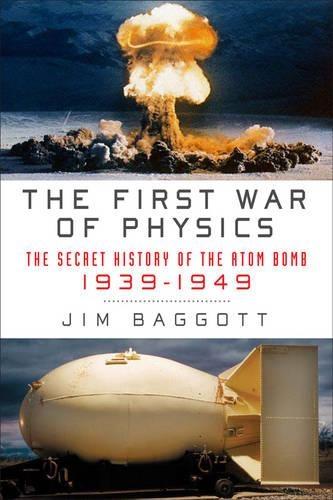Overview
Jim Baggott weaves these threads into a dramatic narrative that spans ten historic years, from the discovery of nuclear fission in 1939 to the aftermath of 'Joe-1, ' August 1949's first Soviet atomic bomb test. Why did physicists persist in developing the atomic bomb, despite the devastation that it could bring? Why, despite having a clear head start, did Hitler's physicists fail? Could the soviets have developed the bomb without spies like Klaus Fuchs or Donald Maclean? Did the allies really plot to assassinate a key member of the German bomb program? Did the physicists knowingly inspire the arms race? The First War of Physics is a grand and frightening story of scientific ambition, intrigue, and genius: a tale barely believable as fiction, which just happens to be historical fact.
Full Product Details
Author: Jim Baggott (Freelance Science Writer)
Publisher: Pegasus Books
Imprint: Pegasus Books
Dimensions:
Width: 16.80cm
, Height: 4.60cm
, Length: 22.60cm
Weight: 0.776kg
ISBN: 9781605980843
ISBN 10: 1605980846
Pages: 584
Publication Date: 13 April 2010
Audience:
General/trade
,
General
Format: Hardback
Publisher's Status: Active
Availability: In Print

This item will be ordered in for you from one of our suppliers. Upon receipt, we will promptly dispatch it out to you. For in store availability, please contact us.
Reviews
I never read such a good, comprehensive account as Jim Baggott's. Highly recommended. -- A. N. Wilson, author of <em>London: A History<em>
[A]n excellent introduction to a vast and complicated topic.--Michael Dobbs I never read such a good, comprehensive account as Jim Baggott's. Highly recommended.--A. N. Wilson, author of London: A History This is a very good book. I particularly like the way Baggott has been able to weave the science, 'grand-scale' politics and espionage together into one compelling narrative.--Mark Walker, author of German National Socialism and the Quest for Nuclear Power World War II changed many things and not the least among them was the relationship of science to the military. Readers interested in this important historic transformation will find Jim Baggott's engaging history replete with drama and insight.--Martin J. Sherwin, co-author of American Prometheus: The Triumph and Tragedy of J. Robert Oppenheimer, winner of the 2006 Pulitzer Prize for Biography Starred Review. As readers will recognize while pondering a conclusion outlining the global implications of the 2002 Moscow Treat on nuclear disarmament, we still live in the shadow of the events chronicled so vividly here.
Author Information
Jim Baggott is an award-winning science writer. A former academic chemist, he maintains a broad interest in science, philosophy, and history, and writes on these subjects for New Scientist and other journals. His books have been widely acclaimed and include A Beginner's Guide to Reality (Pegasus, 2006), The First War of Physics (Pegasus, 2010), The Meaning of Quantum Physics (Oxford, 1992), and Beyond Measure Modern Physics, Philosophy, and the Meaning of Quantum Theory (Oxford, 2004). He lives in England.




